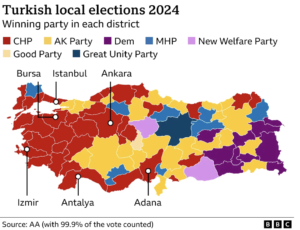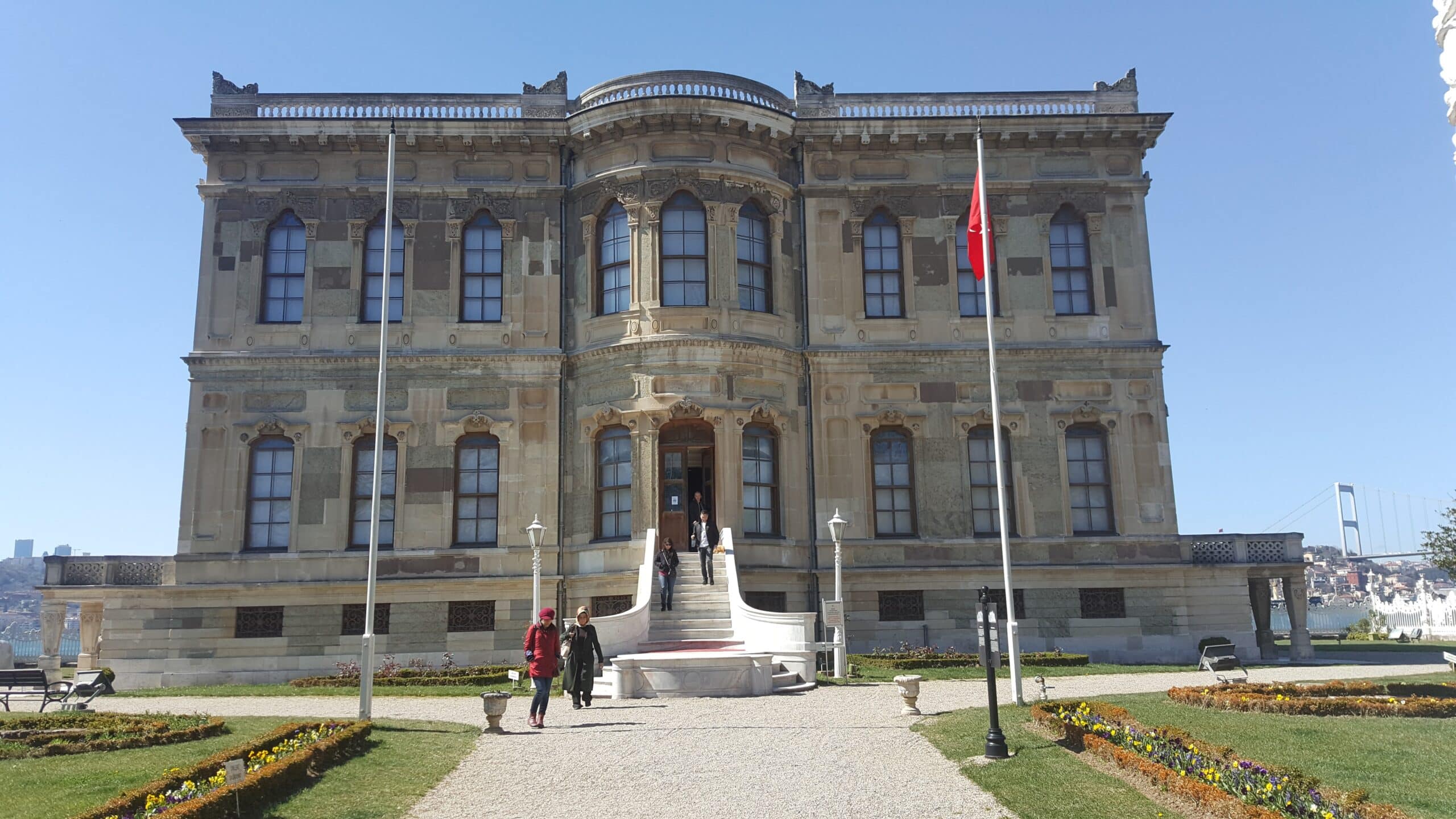
Winning party in each Turkish district
On March 31, local elections in Turkey saw President Recep Tayyip Erdoğan’s Justice and Development Party (the AK Party) lose ground around the country. The main opposition, the Republican People’s Party (CHP), took 38 percent of the popular vote, an 8 percent increase over their showing in 2019. A key figure for the CHP, Istanbul mayor Ekrem Imamoglu, declared the victory “the end of democratic erosion in Turkey and the resurgence of democracy.” But what does this result mean for Turkish democracy?
To understand today’s Turkey, one must first understand what created its current political climate. Since he was elected prime minister in 2003, Erdoğan and his AK party have dominated Turkish politics. His first decade in power coincided with steady economic growth, and was a relatively stable period for the nation. After more than a decade as prime minister, in 2014 he ran for president, a position which until then had had a largely ceremonial role in Turkish politics. Just three years later, he introduced constitutional reforms that endowed the position with full executive power.
In 2013, protests over a heavy-handed state response to a sit-in at a park in Istanbul sparked nationwide protests. An estimated 3.5 million people took to the streets in response. More than eight thousand were injured and five people died. The protests were fuelled by anger at Erdoğan’s government’s reforms which damaged civil liberties — especially freedom of expression.
The most significant threat to Erdoğan’s reign occurred in 2016, when parts of the Turkish military launched a coup. The coup faced quick opposition from many civilians, who took to the streets in protest. The attempt failed, but 241 people were killed and thousands more were injured.
In the aftermath of the coup, more than 50,000 people were detained and more than 100,000 were fired for suspected involvement in the plot. Human Rights Watch and other advocacy groups expressed concern over the suspension of citizens’ protections from torture and ill treatment in the aftermath of the coup, paired with “provisions and practices [which] appear[ed] designed to deliberately make it more difficult to corroborate allegations of torture.” Erdoğan’s crack-down after the coup reaffirmed fears of authoritarian rule and reinforced concern over the future of civil liberties in Turkey.
In 2023, after a period of increased centralization of power following the coup attempt, Erdoğan won his third consecutive term as Turkish president. This year’s local elections in March, however, show a weakening in support for his party. The main opposition party in Turkey, CHP, won 35 of the country’s 81 provinces while earning over a million more votes than the AK party. Opposition candidates won not only in traditional CHP bastions but across the country.
Despite the success of the opposition, the elections were not free of democratic questions. In the Van province, a candidate for the pro-Kurdish party DEM, Abdullah Zeydan, won 55 percent of the vote, but had his victory annulled by a regional court. After several days of protests, the Turkish Supreme Election Council overturned the annulment, allowing Zeydan’s victory to stand. Nonetheless, the incident brought fears of electoral interference to the fore.
Still, the election cycle offers hope to those wanting change in Turkey. There is real hope that Ekrem Imamoglu, who won re-election to Istanbul’s mayorship, could be a compelling leader for the CHP. Turkish scholar Asli Aydintasbas has argued that his charisma, his appeal to a broad coalition — notably both secularist and Kurdish factions — and his history of governance make him a model for liberal candidates around the world.
Turkey’s democracy is teetering, but recent local contests show that it has not been toppled yet. With the right candidate, there may still be hope for the opposition at the national level.
Other posts that may interest you:
- The Trouble with ‘Ecocide’
- Carbon dioxide removal – hit or miss?
- Are France and Japan a Mismatch Made in Heaven?
- A Reflection on Dark Tourism
- Cadavre Exquis : Goodbye stranger
Discover more from The Sundial Press
Subscribe to get the latest posts sent to your email.





